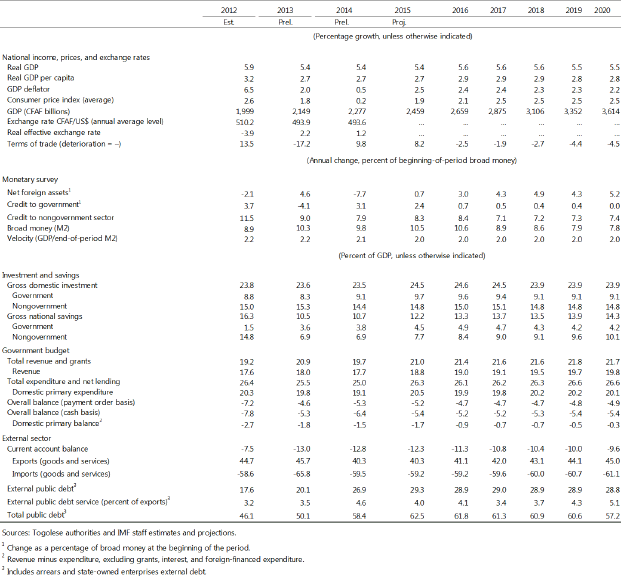Press Release: IMF Executive Board Concludes 2015 Article IV Consultation with Togo
November 13, 2015
On October 26, 2015, the Executive Board of the International Monetary Fund (IMF) concluded the Article IV consultation1 with Togo.
Economic growth has remained strong in recent years, averaging 5.4 percent in 2013-14, on the back of productivity gains in the agricultural sector and public investment in transport infrastructure. The fast pace of public investment has laid the basis for higher growth but has also contributed to a pronounced increase in public debt and current account deficit. Public debt has increased from 46 percent of GDP in 2012 to 58 percent in 2014. The current account deficit widened from 7.5 percent of GDP in 2012 to 13 percent of GDP in 2013–14, primarily as a result of higher imports linked to the development of the transportation network. Inflation slowed to 0.2 percent in 2014 mainly due to declining food prices and reductions in retail fuel prices.
Output growth is expected to be sustained over the medium term, although current account and debt pressures are unlikely to abate and the global environment has deteriorated. Growth is expected to average 5.5 percent in 2015–18, supported by agricultural production, transportation services linked to international trade, and the impact of investments in transport infrastructure, which should facilitate private economic activity. The current account deficit is projected to improve marginally to 12.25 percent of GDP in 2015 as a result of lower oil prices and narrow only to 9.5 percent of GDP by 2020 with the gradual decline in the fiscal deficit and increased savings of state-owned enterprises. Inflation is expected to remain subdued in line with WAEMU trend. The risks to baseline forecasts are largely home-grown, although a sharp slowdown in regional or global growth would inevitably have an impact, mainly through the key trading partners in the region.
Executive Board Assessment2
Executive Directors welcomed Togo’s strong economic growth in recent years on the back of productivity gains in agriculture and public infrastructure investment, which have yielded improvements in social indicators. They noted, however, that the rapid pace of public investment has raised public debt and the current account deficit. Directors emphasized the need to improve fiscal balances and complete the implementation of key fiscal reforms, address financial sector weaknesses, and promote structural transformation to foster more inclusive growth.
Directors underscored the need to place fiscal balances on a sustainable path to ensure debt and external sustainability and create space for social spending. They advised anchoring public finances on a domestic primary balance to reduce the public debt-to-GDP ratio over the medium term. In this regard, they emphasized the need to control current spending, including by continuing to reduce fuel subsidies. They also highlighted the importance of raising the efficiency of public investment to ensure it raises growth. Directors underscored the importance of enhancing public financial and debt management and urged completion of key fiscal reforms, including the reorganization of the Ministry of Finance, developing an effective debt and treasury cash management, establishing a treasury single account, and modernizing revenue administration.
Directors emphasized the need to enforce the regulatory framework in the financial sector, resolve problem banks, and strengthen supervision in the microfinance sector. They recommended that banks with weak regulatory indicators should take immediate corrective action or be subject to resolution. They supported implementing least-cost resolution options when dealing with nonviable financial entities.
Directors stressed that structural transformation is crucial to raise potential growth in Togo, and encouraged the authorities to accelerate implementation of reforms. Noting that improving transport networks has been a principal component of the strategy to raise growth, they recommended complementing this with enhancements in public investment management; the opening to private sector competition of key economic sectors, such as mining, telecommunications, and energy; and further improvements in the business environment. Investing in social development will also be important in making growth inclusive.
Directors highlighted the need to produce national accounts and fiscal data in a more timely and consistent manner, and welcomed the establishment of the national statistics institute.
1 Under Article IV of the IMF's Articles of Agreement, the IMF holds bilateral discussions with members, usually every year. A staff team visits the country, collects economic and financial information, and discusses with officials the country's economic developments and policies. On return to headquarters, the staff prepares a report, which forms the basis for discussion by the Executive Board. 2 At the conclusion of the discussion, the Managing Director, as Chairman of the Board, summarizes the views of Executive Directors, and this summary is transmitted to the country's authorities. An explanation of any qualifiers used in summings up can be found here: http://www.imf.org/external/np/sec/misc/qualifiers.htm |
IMF COMMUNICATIONS DEPARTMENT |
| Media Relations |
|---|
| E-mail: media@imf.org |
| Phone: 202-623-7100 |



